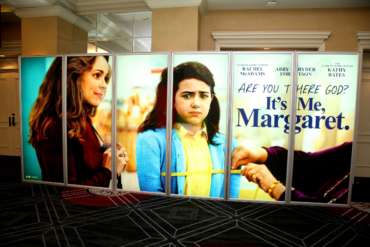Kelly Fremon Craig’s adaptation of Judy Blume’s iconic young adult novel, “Are You There God? It’s Me, Margaret,” has brought to the screen a poignant and nostalgic coming-of-age story. The film takes the audience through the carefree days of a summer camp in New Hampshire, the bustling city of New York City in the 1970s, and ultimately to a Norman Rockwell-esque suburban setting. Throughout the journey, we witness the character development of Margaret, her friendships, her first crush, and her struggle to find her place in the world.
Abby Ryder Fortson delivers a wonderful performance as Margaret Simon, a young girl who is transitioning from childhood to adolescence. She moves with her family from the busy city to the suburbs of New Jersey, leaving behind the skyscrapers and crowded sidewalks to be welcomed by yard sales, supermarket parking lots, and children playing in the sprinklers. Margaret’s introduction to this new suburban lifestyle begins with Nancy, her new neighbor. Elle Graham portrays Nancy with a buoyant energy that overwhelms and charms Margaret. Nancy invites Margaret to join her secret club, which also includes the vivacious Gretchen, played by Katherine Mallen Kupferer, and the quiet Janie, played by Amari Price. Margaret quickly realizes that joining the club is not as easy as she thought, and she learns valuable lessons about peer pressure and the importance of being true to oneself.
The girls’ discussions at their club meetings revolve around boys, especially Philip Leroy, played by Zackary Brooks. The girls gossip about other students, particularly Laura Danker, portrayed by Isol Young, who is already going through puberty. As they wait for their first periods, they try to hurry along the process of puberty by getting training bras and reciting the well-known mantra, “I must, I must, I must increase my bust.” Craig captures these scenes with tenderness, never making the girls seem foolish, even at their silliest. She also depicts how casually cruel the girls can be, especially when they use honesty as an excuse.
Margaret’s coming-of-age journey is not just about her biological changes. Her teacher assigns her a year-long class assignment to research religion, which leads to a heart-wrenching sequence between Margaret and her mother, Barbara, played by Rachel McAdams. Margaret has no religion as her parents want her to choose her own when she grows up, but Barbara reveals that as “devout Christians,” they did not want a Jewish son-in-law. If Margaret married her Jewish boyfriend, Herb, played by Benny Safdie, she would no longer be their daughter. The scene is emotionally charged, and McAdams delivers a mesmerizing performance that almost overshadows Margaret’s story.
Through Craig’s adaptation, Barbara becomes just as fleshed out as Margaret herself. Details from the book, such as Barbara’s love of painting, are given larger importance, with her leaving behind a career as an art teacher for this move to the suburbs. As Margaret adjusts to life at a new school, so does Barbara. Less fulfilled with the burden of buying a new living room set or joining a million PTA committees than she thought she would be, Barbara surrounds herself with her paintings, yearning to find some semblance of artistic inspiration in this new life.
Craig’s adaptation not only offers a coming-of-age story but also an examination of the sacrifices, trauma, and safety that women experience while building their families. However, the script or editing does not seamlessly integrate Barbara’s internal journey with Margaret’s, leaving the viewer wishing for more insight into Barbara’s struggles.
In conclusion, Kelly Fremon Craig’s adaptation of “Are You There God? It’s Me, Margaret,” is a poignant and nostalgic journey through the life of a young girl.

